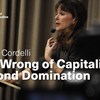disjunctive
Injunctive Versus Functional Inferences From Descriptive Norms Comment on Gelfand and Harrington
Journal of Cross-Cultural Psychology, 0022022115605387. Abstract Cialdini has argued that whereas injunctive norms motivate behavior by their promise of social sanctions, descriptive norms motivate beha
Defining disability and the role of the disability and the medical communities
Theoria Abstract Definitions of disabilityare useful for different purposes and carry normative significance. However, defining disability has proven a difficult task. Communities with different theoreti
The Naturalistic Fallacy Intuition
Kimmo Eriksson, Mälardalen University According to social intuitionist research, moral (or “injunctive”) norms are often not rationally motivated. Where do these norms come from then? We propose that o
Lea Ypi: On dominated dominators
Professor in Political Theory in the Government Department, London School of Economics. ABSTRACT This paper explores the case of dominated dominators as a way of understanding structural domination. I s

Laurie Paul: Value by Acquaintance
Laurie Ann Paul, Milestone Family Professor and Professor of Cognitive Science at Yale University. L.A. Paul's book Transformative Experience has sparked many discussions in philosophy since its publi
Benefiting from Injustice and the Common-Source Problem
Ethical Theory and Moral Practice, pp 1-15, https://doi.org/10.1007/s10677-017-9845-7. Abstract According to the Beneficiary Pays Principle, innocent beneficiaries of an injustice stand in a special mora
Consequentialism and Robust Goods
Utilitas, 1–9, doi:10.1017/S0953820819000116 Abstract In this article, I critique the moral theory developed in Philip Pettit’s The Robust Demands of the Good: Ethics with Attachment, Virtue, and Respecvirtue and respect. I argue that Robust-Goods Consequentialism fails because it implies very implausible value judgements.
European integration and the reconstitution of socio-economic ideologies: Protestant ordoliberalism vs social Catholicism
Journal of European Public Policy Abstract Christian Democratic socio-economic ideology underwent a paradigm shift through the Europeanization of its party networks. Christian Democratic networks starte

Chiara Cordelli: The Wrong of Capitalism Beyond Domination
Political philosophy is witnessing a revival of critiques of capitalism. Against those who argue that capitalism is unjust because of (i) its distributive outcomes, (ii) the oppression of workers at t
Value by Acquaintance with Laurie Ann Paul
Venue: Institute for Futures Studies, Holländargatan 13 in Stockholm Laurie Ann Paul, Milestone Family Professor and Professor of Cognitive Science at Yale University. L.A. Paul's book Transformative Expe has sparked many discussions in philosophy since its publication in 2014. In the book she describes how experiences wehave not had before can transform us in several ways – we can learn new things,and change our views radically – which, among other things, has implicationsfor decision-making.








